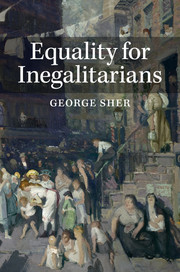Crossref Citations
This Book has been
cited by the following publications. This list is generated based on data provided by Crossref.
2014.
Books Received.
Philosophy,
Vol. 89,
Issue. 4,
p.
671.
2015.
Recent and Recommended Books.
The Good Society,
Vol. 24,
Issue. 2,
p.
218.
2015.
Books Received.
Philosophy,
Vol. 90,
Issue. 1,
p.
167.
Lin, Zi
2016.
The Leverage Approach for Sufficiency?.
Ethical Theory and Moral Practice,
Vol. 19,
Issue. 5,
p.
1203.
Rainbolt, George W.
2017.
The International Encyclopedia of Ethics.
p.
1.
Husi, Stan
2017.
Why We (Almost Certainly) are Not Moral Equals.
The Journal of Ethics,
Vol. 21,
Issue. 4,
p.
375.
Sypnowich, Christine
2017.
What's Left in egalitarianism? Marxism and the limitations of liberal theories of equality.
Philosophy Compass,
Vol. 12,
Issue. 8,
SYPNOWICH, CHRISTINE
2018.
Lessons from Dystopia: Critique, Hope and Political Education.
Journal of Philosophy of Education,
Vol. 52,
Issue. 4,
p.
660.
Merry, Michael S.
2018.
Encyclopedia of Educational Philosophy and Theory.
p.
1.
Murray, Ian
2019.
Donor Advised Funds: What Can North America Learn from the Australian Approach?.
SSRN Electronic Journal ,
Lamey, Andy
2019.
Duty and the Beast.
Ebert, Rainer
2020.
Are Humans More Equal Than Other Animals? An Evolutionary Argument Against Exclusively Human Dignity.
Philosophia,
Vol. 48,
Issue. 5,
p.
1807.
Joshi, Hrishikesh
2020.
What’s Personhood Got to Do with it?.
Philosophia,
Vol. 48,
Issue. 2,
p.
557.
Dwyer, Joseph de la Torre
2020.
Chance, Merit, and Economic Inequality.
p.
1.
Yim, Elaine Lok-Lam
2021.
A Buck-Passing Account of ‘Moral Equality’.
Res Publica,
Vol. 27,
Issue. 1,
p.
25.
Hassoun, Nicole
2021.
Sufficiency and the Minimally Good Life.
Utilitas,
Vol. 33,
Issue. 3,
p.
321.
Nielsen, Lasse
and
Axelsen, David V.
2021.
Being Responsible and Holding Responsible: On the Role of Individual Responsibility in Political Philosophy.
Res Publica,
Vol. 27,
Issue. 4,
p.
641.
Springhorn, Nils
2022.
On the measurement of need-based justice.
Economics and Philosophy,
Vol. 38,
Issue. 3,
p.
466.
O'Brien, David
2023.
Fairness, Care, and Abortion.
Journal of Applied Philosophy,
Vol. 40,
Issue. 4,
p.
658.
Malcai, Ofer
and
Segev, Re’em
2023.
A Dilemma for Luck Egalitarians.
The Journal of Value Inquiry,



